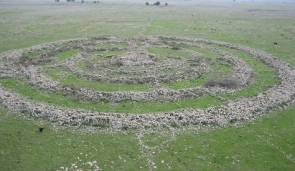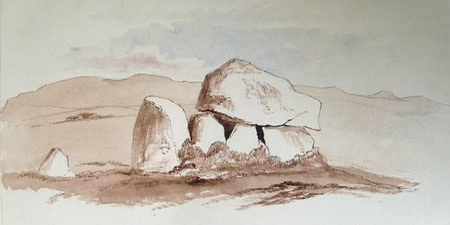1. a New Henge (Earth Rampart) Discovered
at Stone Henge.
Brit-Am Megalithic Bulletin Update
STONEHENGE LATEST NEWS
GEOPHYSICAL SURVEY REVEALS NEW HENGE
http://www.archaeology.ws/stonehenge.html
The discovery of a previously unknown henge monument has been found close to
Stonehenge.
Using the latest geophysical imaging techniques, which "see" below the ground
without excavation, it is possible to make out a dark circle of interrupted
ditch. There are two wider gaps opposite each other - these were entrances to
the monument and are aligned on the midwinter sunset and midsummer sunrise -
like Stonehenge itself. Inside the ditch it is also possible to discern the
slight shadows of 24 postholes encircling the the central area, 25 metres in
diameter. Near the centre are more dark areas indicating pits, and a large
shadow suggesting that a mound was constructed there, perhaps in a later phase
of the monument's use. The henge probably dates to around 2500-3000BC,
contemporary with Stonehenge.
History is set to be rewritten after an archaeology team led by the University
of Birmingham and the Ludwig Boltzmann Institute for Archaeological Prospection
and Virtual Archaeology in Austria discovered a major ceremonial monument less
than one kilometre away from the iconic Stonehenge.
2. a Galgal Refaim in Israel and
Place-Names in Sweden.
Morbid theory in mystery of Israel's answer to Stone Henge
Forwarded by Orjan Svensson from Sweden.
 |
Comments by Orjan:
I find it interesting that Rujm in
Arabic means "heap of stones" or "hill". Many Swedish place-names have RUM in
their name. Maybe it could be of the same origin... maybe Hebrew RoGeM'
[In Hebrew RoGeM means to throw stones at.]
|
Archaeologist Rami Arav links structure of concentric stone circles in the Golan
Heights, known as Rujm al-Hiri in Arabic and Galgal Refaim in Hebrew, to ancient
method of disposing of the dead.
http://www.haaretz.com/news/national/
morbid-theory-in-mystery-of-israel
-s-answer-to-stone-henge-1.393568
Extracts:
The site's name means "stone heap of the wild cats" in Arabic. In Hebrew it is
known as Galgal Refaim, or the "wheel of ghosts." It was first noticed by
scholars in 1968, a year after Israel captured the Golan Heights from Syria, and
despite its intriguing nature it has attracted few visitors. Unmarked, it lies
an hour's hike from the nearest road, near old minefields, an abandoned military
bunker and a few grazing cattle.
Rujm al-Hiri's unremarkable appearance from the ground belies its striking form
when seen from the air: It consists of four circles ' the outermost more than
500 feet across ' made up of an estimated 42,000 tons of basalt stone, the
remains of massive walls that experts believe once rose as much as high as 30
feet. It is an enormous feat of construction carried out 6000 years ago by a
society about which little is known.
Most scholars have identified Rujm al-Hiri as some kind of ritual center, with
some believing it connected to astronomical calculations. Archaeologist Yonathan
Mizrahi, one of the first to excavate there, found that to someone standing in
the very center of the circles on the morning of the summer solstice in 3000
B.C., "the first gleam of sunrise would appear at the center of the northeast
entryway in the outer wall."
Freikman's excavations have yielded almost no material remains of the kind that
are common at most archaeological sites, he said. That is significant, however,
as it confirms that the site was never lived in and was thus not a defensive
position or a residential quarter but most likely a ritual center of some kind '
possibly, he said, one indeed linked to a cult of the dead.
3. a The Sacred Isle: An Introduction to
Irish Megalithics.
http://www.carrowkeel.com/files/main.html
Extracts:
That these engravings deal with astronomical themes is demonstrated in
several sites, where the artwork is illuminated by the light of the sun or moon
at a chosen time in the cycle of the body in question.
Irish mythological stories list the early inhabitants of Ireland: The
Parthelonians, the Nemedians, The Formorians, The Fir Bolg, The Tuatha De Danann
and the Celts. Many of the stories refer to megalithic monuments as being
inhabited by one or another of these tribes, and in particular many are
associated with the Tuatha De Danann. One of the chief members of the Tuatha De
Danann, The Dagda or Good God was said to live in Newgrange, and also to have a
home by Lough Arrow, presumably at Heapstown.
 | Dolmen 13 at Carrowmore, in a beautiful watercolour by William Wakeman dating
from the late 1870's when he illustrated many monuments in County Sligo. |
For Previous issues see:
BAMBU Archives: Contents
To Make an Offering to Brit-Am
Send a check to
Brit-Am
POB 595
Jerusalem 91004
Israel
or deposit a donation in our
PayPal Account
http://britam.org/books.html#donate
Offering to Brit-Am
The name "Ephraim" in Hebrew Letters as Seen
by Satellite in the Hills of Ephraim

See also:
BAMBU Archives: Contents
For a Map and List of Israelite Migratory Routes see:
http://www.britam.org/
Questions/QuesHistory.html#Migratory
For more maps of the Megalithic Trail of Migration see:
http://www.britam.org/Proof/
Attributes/roleDolmen.html
There is much archaeological evidence some of which we have quoted in the past.
http://www.britam.org/Questions
/QuesArchaeology.html#Stonehenge
Dolmens and the Bible
http://www.britam.org/Proof/
Attributes/roleDolmen.html
Correspond with us
Send Comments or Criticisms
You may not always receive an immediate answer
but anything you say will be considered and appreciated
Send us an
e-mail
Books and Offering Opportunities
Main Page
|



